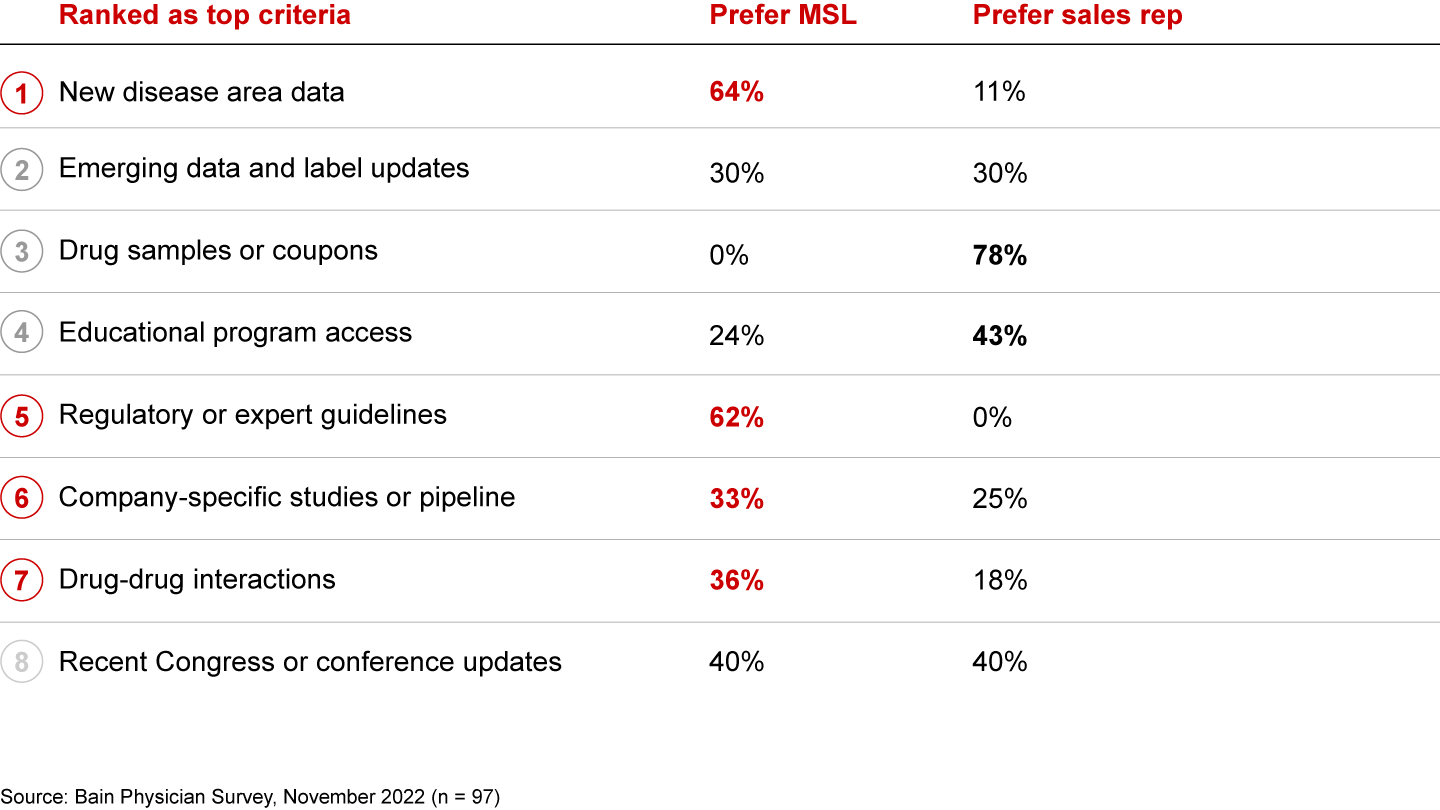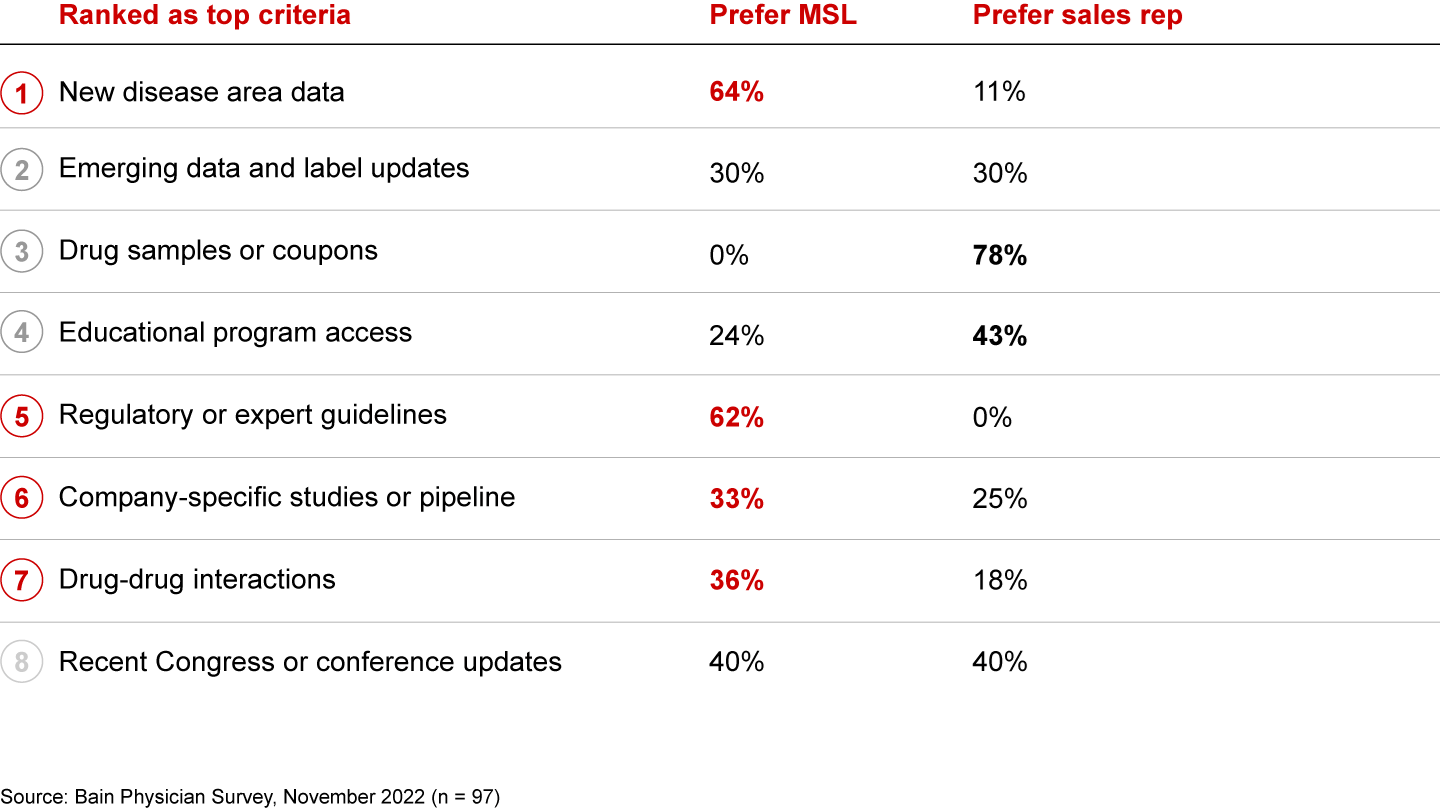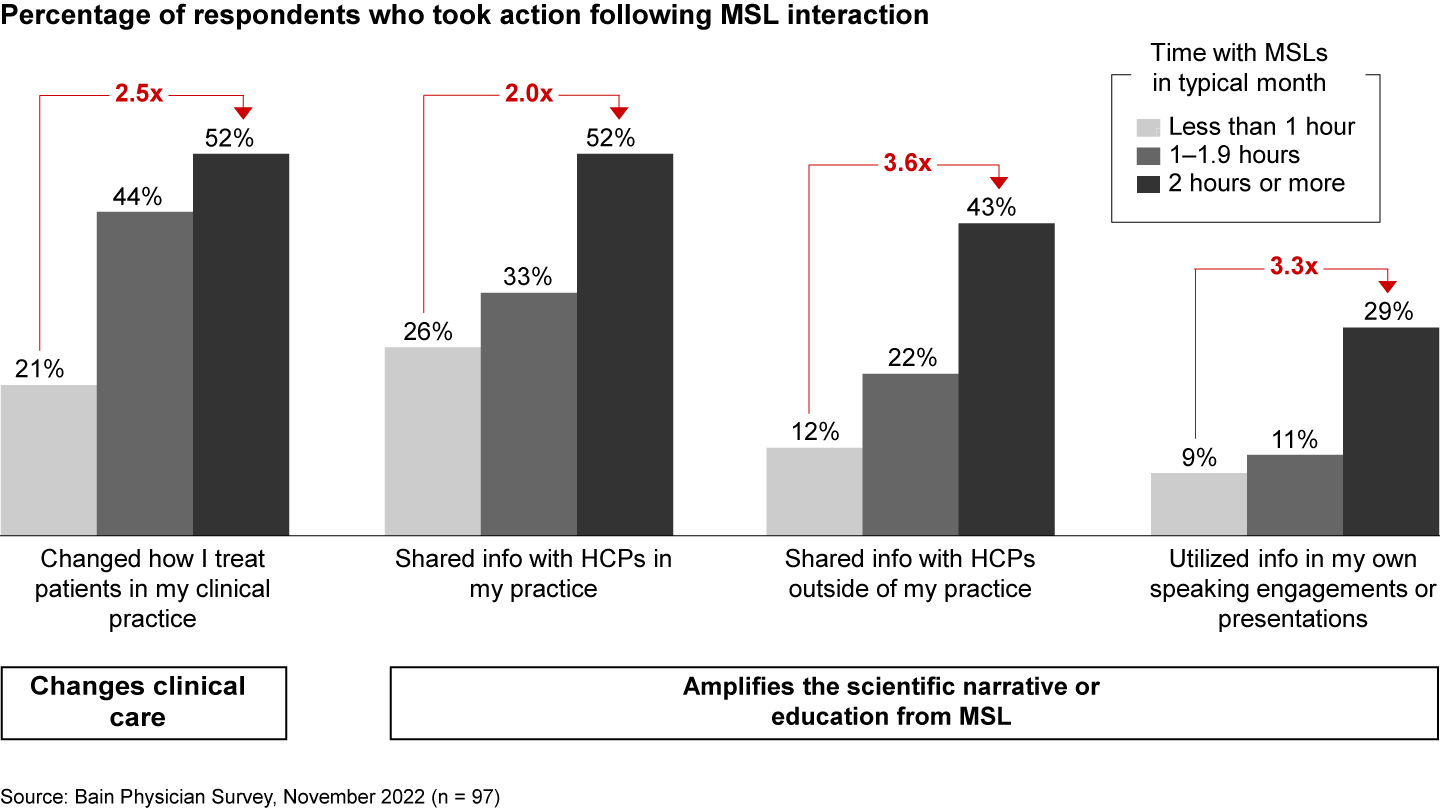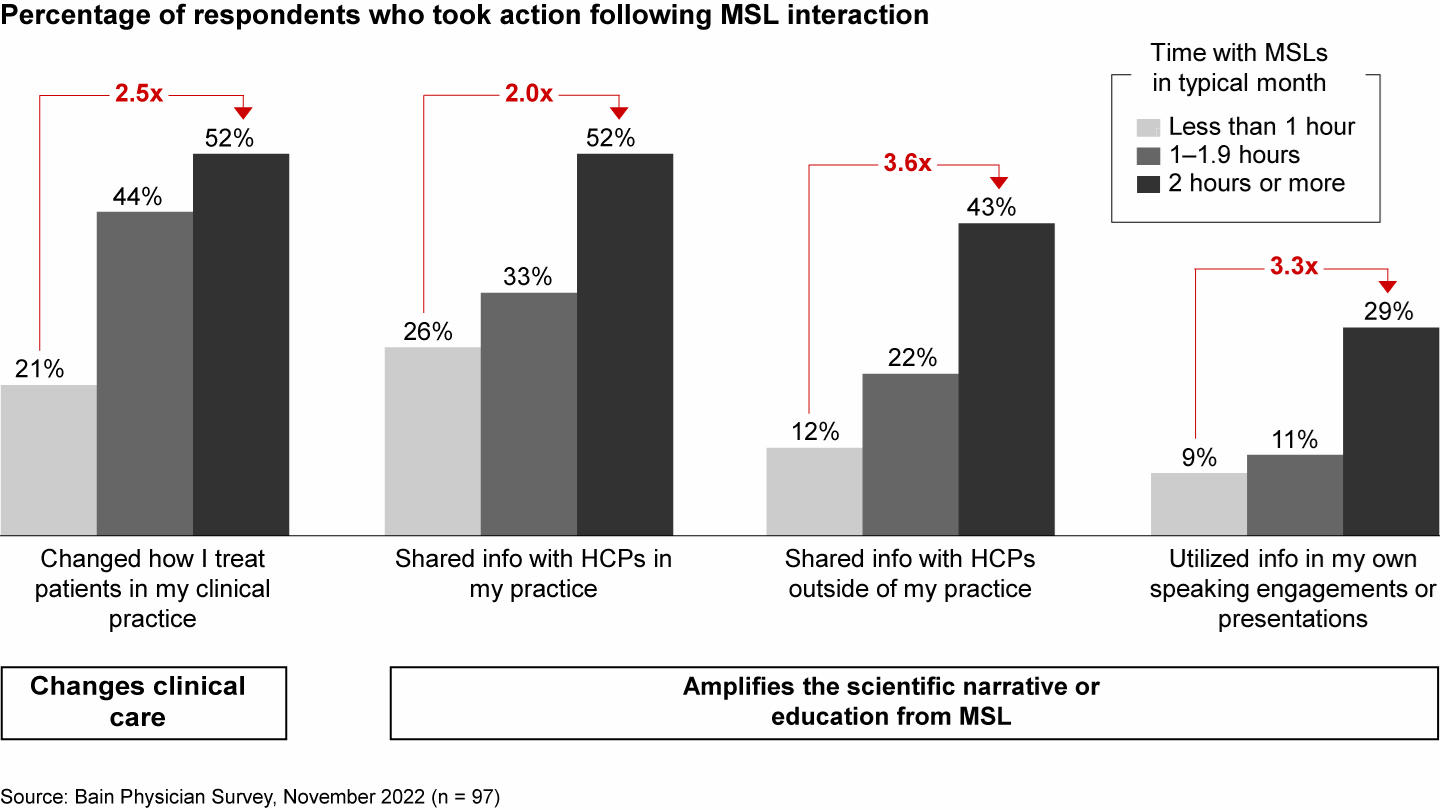Etude

Never before have physicians faced the amount of clinical complexity that they face today—from narrower, more specific indications to a ballooning number of clinical guidelines to an abundance of available data.
But pharma companies can help break through the noise. Medical affairs can serve as physicians' beacon, supporting the integration of scientific evidence into real-world, clinical practice for more effective patient care.
A recent Bain survey reveals that a greater focus on medical affairs is paramount to delivering a therapeutic product’s full potential. In fact, about one-third of healthcare providers say interactions with medical science liaisons (MSLs) have changed how they treat patients in their clinical practice.
As pharma companies strive to increase customer awareness, attention, and advocacy, medical affairs can be an integral part of the solution.
Awareness
Pharma companies’ overall access to healthcare providers is decreasing and will likely remain a challenge. This decline means it is increasingly difficult to boost awareness of new advances in a disease state.
According to our survey, physicians across specialties want to reduce time spent with pharma companies by more than 25%. And yet, 50% of physicians want more time with MSLs, compared with just 25% who want more time with sales reps.
Physicians’ desired decrease in the time they currently spend with pharma companies
Physicians who say they want more time with MSLs vs. sales reps
Attention
As pharma companies confront declining access to healthcare providers, holding physicians’ attention is more pressing than ever. Focused investments to meet physicians’ greatest needs can help.
Physicians say new disease area data is the most important service that pharma companies provide. Medical affairs can play a primary role in fulfilling this need: Sixty-four percent of physicians prefer to receive this information from an MSL, compared with just 11% who prefer a sales rep (see Figure 1).


Providers also prefer to receive regulatory and expert guidelines, pipeline information, and data on drug-drug interactions from MSLs. In these top criteria areas, medical affairs organizations are in a unique position to augment the value of sales reps.
Why are MSLs becoming the go-to source for several key services? Physicians see MSLs as balanced, credible sources of data. According to our survey, 51% of physicians feel MSLs are fair and unbiased, while only 32% of physicians feel sales reps are fair and unbiased.
Advocacy
The time that MSLs spend with physicians can be highly valuable and effective. When asked who has a greater influence on their clinical care decisions, three times as many physicians cited MSLs over sales reps.
In addition, healthcare providers who spend more time with MSLs are two to four times more likely to change how they treat patients and share information with other healthcare providers, both in their practice and in other practices (see Figure 2).


Where to invest in medical affairs
As medical affairs organizations invest in becoming more customer centric, three areas present outsized opportunities to innovate and differentiate: evidence generation, stakeholder engagement, and customer insights.
Evidence generation
We are moving from a world where evidence was predominantly generated prelaunch from randomized clinical trials to one where ongoing generation of the right evidence is imperative to achieving a drug’s full potential. That makes a strong evidence-generation engine a real source of competitive differentiation.
A successful evidence-generation engine takes a holistic approach by addressing the needs of all stakeholders who influence clinical practices—not just payers and providers. It includes tailored evidence for health systems and population health decision makers, patient organizations, and government organizations. Medical affairs organizations play a central role in developing integrated, cross-functional plans that prioritize evidence with the greatest patient impact, whether that be advancing payer access, expanding into new populations, or addressing provider questions.
As providers try to navigate the wealth of available disease area and treatment data, the most effective MSLs will know exactly which educational gaps to fill and which evidence to bring to bear. This is especially critical in disease areas with increasing competition, where having a strong, differentiated medical narrative and a comparative value proposition are key to success.
For instance, facing increasing competition from a new entrant, one long-term leader in a therapeutic area needed to quickly cement a differentiated medical narrative and protect against the competitor’s claims. The company invested in new comparative studies on head-to-head efficacy and safety, as well as proactive evidence generation related to switching and long-term success. Its medical affairs organization also used case studies and existing registries to quickly build real-world evidence, while planning and executing longer term studies for real-world data.
Stakeholder engagement
Leading pharma companies are considering where MSLs can play a more strategic customer-facing role across stakeholders. Specifically, medical affairs functions have an opportunity to engage not only specialists and key opinion leaders but all stakeholders who have influence over treatment decisions.
For example, as treatment for a specialized indication matures, and care management starts to shift from academic centers to primary and community care, it can create a large education gap between specialized physicians and primary care and community physicians on the disease state and treatment options. To address such a gap, one medical affairs organization transformed its go-to-market model to ensure there were dedicated roles for distinct stakeholder needs. It invested in key account management for payers and major institutions, MSL teams dedicated to academics and community practices, and new roles for patient organization engagement and initiatives.
Scaling this type of stakeholder engagement in a thoughtful, cost-conscious way requires innovative alternatives, rather than simply growing the field force. For example, some medical affairs organizations amplify their direct engagement through digital partnerships and platforms like Doximity or online journal clubs to share clinically relevant and compliant communications with providers. Enabling provider self-service on MedInfo websites can also cut down on MSLs’ reactive activities, redirecting their time and energy to more proactive efforts.
Overall, the most advanced medical affairs organizations are focusing on the stakeholders with the highest patient impact. They deeply understand those providers’ unique needs based on their specific patients, then tailor messages and engagement accordingly.
Customer insights
As access to customers continues to contract, both in volume and length of interactions, it will be vital for pharma companies to capture and utilize insights to inform their strategies, tailor their engagements, and refine their approaches.
What makes a best-in-class closed-loop insights engine? Successful pharma companies have operationalized feedback loops using a combination of:
- tools, like AI-powered platforms to capture real-time perceptions and sentiments, as well as fully automated use of machine learning and natural language processing to identify trends and insights from structured and unstructured data;
- processes to aggregate, distill, and share insights across R&D, commercial, and medical affairs on a regular basis; and
- governance to ensure the appropriate guardrails are in place to collect and share information compliantly.
Closed-loop insights are particularly critical when launching a new therapy, as the market is being shaped in real time. Here, medical affairs teams can double down on investments to ensure they understand how providers think and talk about the disease, the unmet need, patient segments, and challenges in care coordination.
For example, when preparing to launch a therapy for a previously untreated rare disease, one pharma company was grappling with limited available information—including insight into where patients were in the course of their current care journey, and how physicians could integrate the new treatment into their practice. To develop an effective launch strategy, the company heavily invested in prelaunch medical affairs insight generation through ad boards and one-on-one MSL engagements. The medical affairs team also established formal mechanisms to aggregate and synthesize insights. Finally, the company included medical affairs as a key member in the strategic launch planning, effectively bringing patient and provider voices to the table.
With the current pace of scientific and technology development, the complexity of the care ecosystem will only intensify. Medical affairs functions are uniquely positioned to cut through the noise and improve the integration of scientific evidence into clinical practice. When empowered through focused, sufficient investments, medical affairs teams can increase customer awareness, drive customer advocacy, and sustain customers’ attention, ultimately maximizing positive outcomes for patients and helping physicians deliver better care.